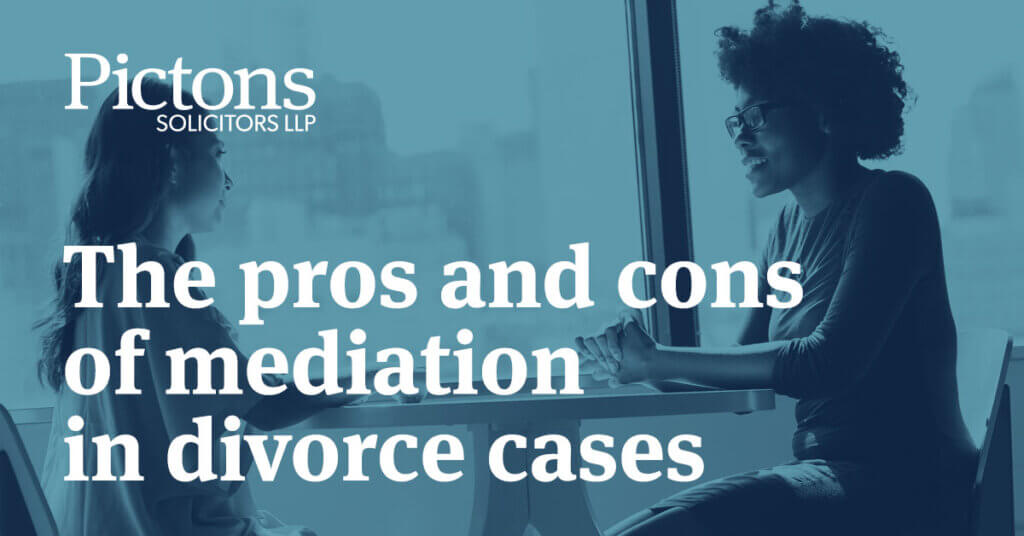The pros and cons of mediation in divorce cases

Recently, the Ministry of Justice put forward proposals to legally enforce mediation on parents who are separating. The proposals introduce a new power for judges to order divorcing parents to make reasonable attempts in mediation. Couples could face fines for refusing mediation.
The family court system is currently overburdened and enforced mediation may help ease that pressure. But does mediation work? And will all parties benefit?
Pros and cons of mediation
Successful mediation can be quicker and more cost effective than a court case. However, the success of the mediation depends on the complexity of the issues involved and the willingness of both parties to engage fully in the process.
The starting point for successful mediation is that there needs to be a level playing field. A victim of domestic violence or coercive control may be too afraid to speak openly; someone who is used to always having the upper hand in a relationship may not be keen on mediation.
The Ministry of Justice has stated that mandatory mediation will exclude cases where there are allegations or a history of domestic abuse. However, it is unclear as to such how cases will be assessed. Whatever the outcome, early legal advice is always helpful to ensure that safeguarding issues are flagged up.
Both parties need to be open to the mediation process. For separating couples, this is not always easy in the middle of what is already an emotional time. They may feel that they are not in the right frame of mind to be making important decisions about their long-term future.
Mediation is carried out in a more informal, relaxed setting than a court case and, as such, may prove less stressful than going to court. However, it must be noted that, agreements made in mediation are not legally binding. To make an agreement legally binding, a solicitor needs to set out the provisions in a consent order. Once a judge has approved the order this makes it legally binding and enforceable.
Family mediators are trained to help couples discuss the specific issues that they need to resolve following the end of a relationship. This can be sorting out financial matters such as the family home and dealing with the arrangements for the children. Meetings are confidential and the parties can discuss a range of outcomes without fear of being held to them if court proceedings are later issued.
A family solicitor can help you before mediation starts, in between sessions, and when an agreement has been reached. Both parties need legal advice as to what amounts to a fair outcome. The mediator cannot give you this advice as their role is to allow both parties to set out their position and encourage mutual understanding, with the aim ultimately of reaching an agreement. The mediator is a neutral third party who listens to both parties, provides a safe environment for discussion and helps you both consider various options and alternatives so that you can reach your own decisions. Not all mediators are legally trained, so it is very important before you attend a mediation session that you are clear what your legal rights and responsibilities are by taking advice from a family law solicitor.
Solicitors and mediators often work hand in hand, although solicitors rarely attend mediation sessions themselves. Instead, your solicitor will help you prepare for the mediation, advise on your legal position and how a judge might approach things if called upon to do so. This can provide you with the confidence to hold your position during the mediation sessions or understand the points you might need to concede.
If both parties understand the framework they are working to, they can use mediation to work through the best outcome for their family unit. The parties can check in with their solicitors in between meetings to check that all the issues are being covered and whether the possible options being discussed fall within the range of outcomes that would be deemed fair in law.
Celebrity divorces have often been reported in the press as aggressive and painful affairs, with each party out to take the other “to the cleaners”. The lives of the children living at the centre of that conflict are often forgotten. For many people, their experience and understanding of divorce comes from the media’s reporting of celebrity divorces. Chris Martin and Gwyneth Paltrow sought to rewrite this narrative and in fact their experience fits into a positive trend of reducing conflict during divorce. It has been widely reported that Chris Martin and Gwyneth Paltrow chose to navigate their divorce using mediation.
Family mediation voucher scheme extended
As part of the government’s push to encourage mediation, the family mediation voucher scheme has been extended until April 2025 and will receive an additional £15m of funding. The scheme provides vouchers worth up to £500 to help parents resolve disputes through mediation. To date it has supported over 15,000 families.
Mediation can be very useful in divorce cases. However, it is important to make sure any agreements are checked by a solicitor. This is to ensure no mistakes have been made, nothing has been missed, and that the right steps are taken to make the agreement legally binding.
Should you require guidance with your divorce or mediation matters, please contact our specialist, experienced and compassionate team.